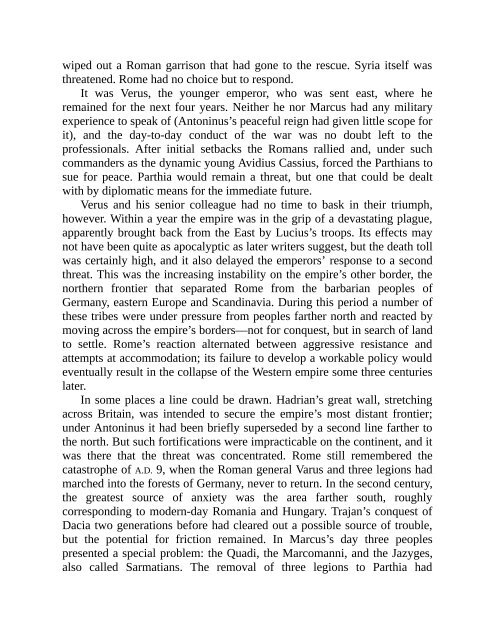9781945186240
You also want an ePaper? Increase the reach of your titles
YUMPU automatically turns print PDFs into web optimized ePapers that Google loves.
wiped out a Roman garrison that had gone to the rescue. Syria itself was<br />
threatened. Rome had no choice but to respond.<br />
It was Verus, the younger emperor, who was sent east, where he<br />
remained for the next four years. Neither he nor Marcus had any military<br />
experience to speak of (Antoninus’s peaceful reign had given little scope for<br />
it), and the day-to-day conduct of the war was no doubt left to the<br />
professionals. After initial setbacks the Romans rallied and, under such<br />
commanders as the dynamic young Avidius Cassius, forced the Parthians to<br />
sue for peace. Parthia would remain a threat, but one that could be dealt<br />
with by diplomatic means for the immediate future.<br />
Verus and his senior colleague had no time to bask in their triumph,<br />
however. Within a year the empire was in the grip of a devastating plague,<br />
apparently brought back from the East by Lucius’s troops. Its effects may<br />
not have been quite as apocalyptic as later writers suggest, but the death toll<br />
was certainly high, and it also delayed the emperors’ response to a second<br />
threat. This was the increasing instability on the empire’s other border, the<br />
northern frontier that separated Rome from the barbarian peoples of<br />
Germany, eastern Europe and Scandinavia. During this period a number of<br />
these tribes were under pressure from peoples farther north and reacted by<br />
moving across the empire’s borders—not for conquest, but in search of land<br />
to settle. Rome’s reaction alternated between aggressive resistance and<br />
attempts at accommodation; its failure to develop a workable policy would<br />
eventually result in the collapse of the Western empire some three centuries<br />
later.<br />
In some places a line could be drawn. Hadrian’s great wall, stretching<br />
across Britain, was intended to secure the empire’s most distant frontier;<br />
under Antoninus it had been briefly superseded by a second line farther to<br />
the north. But such fortifications were impracticable on the continent, and it<br />
was there that the threat was concentrated. Rome still remembered the<br />
catastrophe of A.D. 9, when the Roman general Varus and three legions had<br />
marched into the forests of Germany, never to return. In the second century,<br />
the greatest source of anxiety was the area farther south, roughly<br />
corresponding to modern-day Romania and Hungary. Trajan’s conquest of<br />
Dacia two generations before had cleared out a possible source of trouble,<br />
but the potential for friction remained. In Marcus’s day three peoples<br />
presented a special problem: the Quadi, the Marcomanni, and the Jazyges,<br />
also called Sarmatians. The removal of three legions to Parthia had


